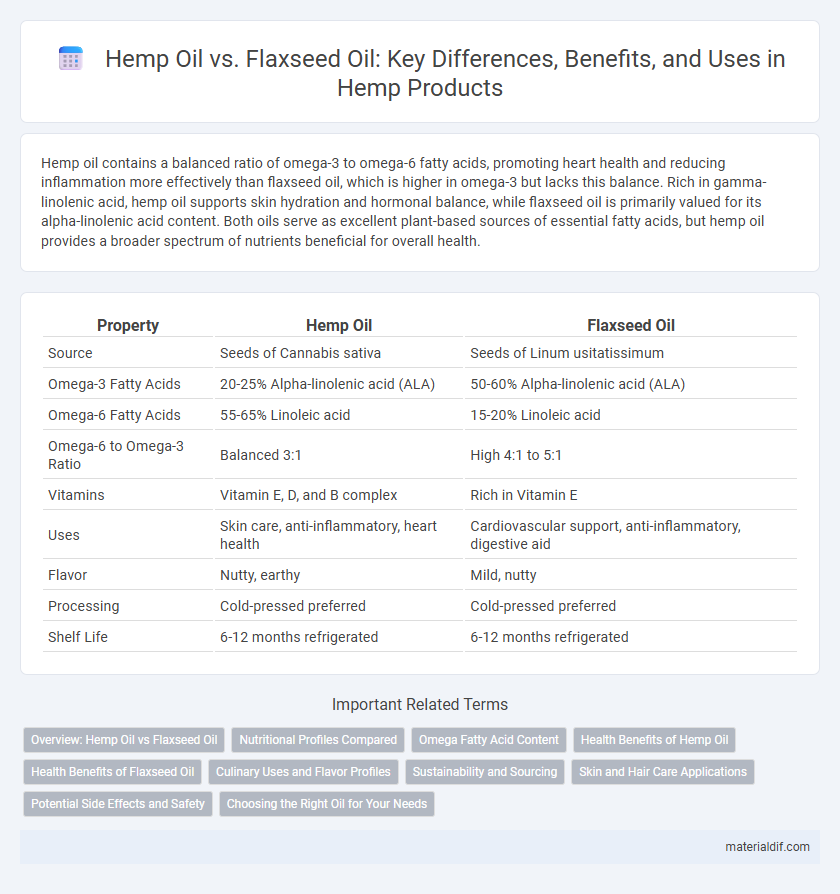Hemp oil contains a balanced ratio of omega-3 to omega-6 fatty acids, promoting heart health and reducing inflammation more effectively than flaxseed oil, which is higher in omega-3 but lacks this balance. Rich in gamma-linolenic acid, hemp oil supports skin hydration and hormonal balance, while flaxseed oil is primarily valued for its alpha-linolenic acid content. Both oils serve as excellent plant-based sources of essential fatty acids, but hemp oil provides a broader spectrum of nutrients beneficial for overall health.
Table of Comparison
| Property | Hemp Oil | Flaxseed Oil |
|---|---|---|
| Source | Seeds of Cannabis sativa | Seeds of Linum usitatissimum |
| Omega-3 Fatty Acids | 20-25% Alpha-linolenic acid (ALA) | 50-60% Alpha-linolenic acid (ALA) |
| Omega-6 Fatty Acids | 55-65% Linoleic acid | 15-20% Linoleic acid |
| Omega-6 to Omega-3 Ratio | Balanced 3:1 | High 4:1 to 5:1 |
| Vitamins | Vitamin E, D, and B complex | Rich in Vitamin E |
| Uses | Skin care, anti-inflammatory, heart health | Cardiovascular support, anti-inflammatory, digestive aid |
| Flavor | Nutty, earthy | Mild, nutty |
| Processing | Cold-pressed preferred | Cold-pressed preferred |
| Shelf Life | 6-12 months refrigerated | 6-12 months refrigerated |
Overview: Hemp Oil vs Flaxseed Oil
Hemp oil and flaxseed oil are both rich sources of essential fatty acids, but hemp oil contains a nearly ideal 3:1 ratio of omega-6 to omega-3, promoting optimal cardiovascular health. Flaxseed oil provides a higher concentration of alpha-linolenic acid (ALA), an omega-3 fatty acid known for reducing inflammation and supporting brain function. Both oils offer unique nutritional profiles, making them valuable for different dietary and therapeutic uses.
Nutritional Profiles Compared
Hemp oil contains a balanced ratio of omega-6 to omega-3 fatty acids, typically around 3:1, which supports cardiovascular health and reduces inflammation. Flaxseed oil provides a higher concentration of alpha-linolenic acid (ALA), an essential omega-3 fatty acid crucial for brain function and skin health. Both oils are rich in antioxidants and vitamin E, but hemp oil also offers gamma-linolenic acid (GLA), which has unique anti-inflammatory properties not found in flaxseed oil.
Omega Fatty Acid Content
Hemp oil contains an ideal balance of Omega-6 to Omega-3 fatty acids, typically around 3:1, providing essential fatty acids like linoleic acid and alpha-linolenic acid that support heart and brain health. Flaxseed oil is exceptionally high in Omega-3 alpha-linolenic acid, often exceeding 50% of its fatty acid content, making it a potent source for reducing inflammation. Both oils offer unique health benefits through their fatty acid profiles, with hemp oil supplying a balanced ratio and flaxseed oil delivering concentrated Omega-3s.
Health Benefits of Hemp Oil
Hemp oil offers a superior balance of omega-3 and omega-6 fatty acids, promoting cardiovascular health and reducing inflammation more effectively than flaxseed oil. Rich in gamma-linolenic acid (GLA), hemp oil supports hormonal balance and skin health. Its high antioxidant content further enhances immune function and cellular repair.
Health Benefits of Flaxseed Oil
Flaxseed oil is rich in alpha-linolenic acid (ALA), an essential omega-3 fatty acid known for supporting cardiovascular health and reducing inflammation. It contains lignans and antioxidants that help lower cholesterol levels and promote hormone balance. Compared to hemp oil, flaxseed oil offers a higher concentration of omega-3s, making it a potent choice for improving skin health and reducing risks associated with chronic diseases.
Culinary Uses and Flavor Profiles
Hemp oil offers a nutty, earthy flavor that complements salad dressings, dips, and low-heat cooking, preserving its rich omega-3 and omega-6 fatty acids. Flaxseed oil has a milder, slightly nutty taste ideal for drizzling over foods or blending into smoothies but should not be heated due to its low smoke point. Both oils provide nutritional benefits, with hemp oil's balanced fatty acid profile making it versatile in savory dishes compared to flaxseed oil's focus on raw culinary applications.
Sustainability and Sourcing
Hemp oil production is considered highly sustainable due to hemp's rapid growth cycle, low water requirements, and ability to improve soil health through phytoremediation. Flaxseed oil sourcing often involves intensive agricultural practices that may deplete soil nutrients and require more pesticides, impacting environmental sustainability. Choosing hemp oil supports regenerative farming practices and reduces ecological footprints compared to conventional flaxseed oil cultivation.
Skin and Hair Care Applications
Hemp oil, rich in omega-6 and omega-3 fatty acids with a balanced 3:1 ratio, deeply nourishes skin and hair, promoting hydration and reducing inflammation more effectively than flaxseed oil, which primarily contains alpha-linolenic acid (ALA). Its unique gamma-linolenic acid (GLA) content enhances skin elasticity and supports scalp health, making it superior for soothing conditions like eczema and psoriasis while strengthening hair follicles. Flaxseed oil, while beneficial for dry skin and dull hair, lacks the comprehensive lipid profile of hemp oil, limiting its efficacy in intensive skin barrier repair and hair regeneration.
Potential Side Effects and Safety
Hemp oil and flaxseed oil both offer health benefits but differ in potential side effects and safety profiles. Hemp oil contains omega-3 and omega-6 fatty acids with a balanced ratio, posing minimal risk of adverse reactions, though it may cause mild gastrointestinal discomfort or allergic reactions in sensitive individuals. Flaxseed oil, rich in alpha-linolenic acid (ALA), can lead to digestive issues like bloating or diarrhea at high doses and may interact with blood thinners, necessitating caution for certain users.
Choosing the Right Oil for Your Needs
Hemp oil contains a balanced ratio of omega-6 to omega-3 fatty acids, making it ideal for supporting heart health and reducing inflammation. Flaxseed oil has a higher concentration of omega-3 alpha-linolenic acid (ALA), which is beneficial for brain function and cognitive health. Selecting the right oil depends on your specific nutritional goals, with hemp oil favored for overall skin and cardiovascular support, while flaxseed oil is preferred for enhancing omega-3 intake.
Hemp oil vs flaxseed oil Infographic

 materialdif.com
materialdif.com